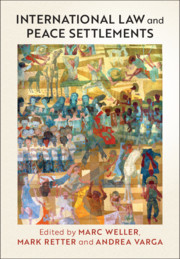Book contents
- International Law and Peace Settlements
- International Law and Peace Settlements
- Copyright page
- Contents
- Contributors
- Preface and Acknowledgements
- Case Law
- Peace Agreements and Instruments
- Abbreviations
- 1 Introduction
- Part I Historical Dimensions to Peace Settlement Practice
- Part II Peace Agreements As Legal Instruments
- Part III Key Actors and the Role of International Law
- Part IV Representation, Sovereignty and Governance
- Part V Economic Aspects of Peace Settlements
- 20 Political Economy, International Law and Peace Agreements
- 21 Balancing National Ownership with International Intervention
- 22 Sharing Resource Wealth in Conflict Settlements
- 23 Overcoming Violence in Maritime Conflicts with Provisional Arrangements
- 24 Financing Peace through Law?
- Part VI Humanitarian Obligations and Human Rights
- Conclusion
- Index
22 - Sharing Resource Wealth in Conflict Settlements
from Part V - Economic Aspects of Peace Settlements
Published online by Cambridge University Press: 14 January 2021
- International Law and Peace Settlements
- International Law and Peace Settlements
- Copyright page
- Contents
- Contributors
- Preface and Acknowledgements
- Case Law
- Peace Agreements and Instruments
- Abbreviations
- 1 Introduction
- Part I Historical Dimensions to Peace Settlement Practice
- Part II Peace Agreements As Legal Instruments
- Part III Key Actors and the Role of International Law
- Part IV Representation, Sovereignty and Governance
- Part V Economic Aspects of Peace Settlements
- 20 Political Economy, International Law and Peace Agreements
- 21 Balancing National Ownership with International Intervention
- 22 Sharing Resource Wealth in Conflict Settlements
- 23 Overcoming Violence in Maritime Conflicts with Provisional Arrangements
- 24 Financing Peace through Law?
- Part VI Humanitarian Obligations and Human Rights
- Conclusion
- Index
Summary
The chapter examines three distinct issues related to the sharing of resources in conflict settlements: revenue sharing, shared access to and use of a resource (e.g. water); and shared management arrangements. It draws lessons from how these issues have been handled in federal and devolved governance regimes. It distinguishes between how resource provisions may relate to ending a conflict on the one hand and to promoting longer-term development on the other hand. In finds that relatively few conflict settlements include meaningful provisions on these three aspects of resource sharing. The sharing of revenues, or of access to a resource, is easier to resolve than sharing of management, though there can still be important engagement of local and regional communities and governments in the decision-making process. Moreover, there are established guidelines on good resource and revenue management, including in devolved contexts, that should be considered in peace settlements.
- Type
- Chapter
- Information
- International Law and Peace Settlements , pp. 499 - 524Publisher: Cambridge University PressPrint publication year: 2021

